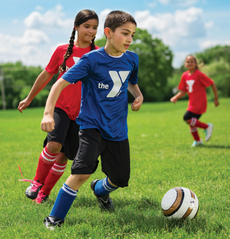
- A survey conducted by the Sports & Fitness Industry Association showed that 30 percent of youth ages six to 12 and 42.7 percent ages 13 to 17 played sports in 2008. Those numbers dropped to 26.6 percent and 39.3 percent by 2015.
- According to Aspen Project Play, access to sports can be shaped by race, income, geography and gender. For example, in “low socio-economic schools” that serve the highest percentage of students qualifying for free or reduced-price lunches, only 24.6 percent of eighth graders play sports, compared to 36.1 percent of eighth graders at “high socio-economic schools.”
- The U.S. Department of Education reports that high school athletes are more likely than non-athletes to attend and graduate from college, and those benefits extend to the workplace – a survey of 400 female corporate executives found that 94 percent had played a sport, according to ESPN.
The YMCA of the North, a leading nonprofit dedicated to strengthening communities through youth development, healthy living and social responsibility, gives all youth the opportunity to thrive in sports programs that emphasize inclusivity, build character and teach life lessons.
Studies show that youth in sports are more likely to succeed in school and develop important skills like goal-setting, self-esteem and leadership. The Y is committed to providing that opportunity to as many young people as possible by eliminating barriers to participation and creating an inclusive environment that gives kids of all backgrounds and skill levels a safe place to play, grow and thrive.
“YMCA sports are built on the idea that everyone has an opportunity to play,” said Thomas Chatman, association athletic director for the YMCA of the North. “Sports are all about building positive relationships and participating in your community. Our athletes come from all backgrounds to unite as a team and develop lifelong friendships.”
Chatman explained that sports help young people build character and leadership skills. Players learn to respect and appreciate their teammates and competitors; develop communication, trust and good sportsmanship; and build work ethic. Sports programs also become a vehicle to build community. Athletes from all backgrounds connect as a team, and their participation connects their families to the larger community at the Y. Parents and other family members are encouraged to get involved by attending practices and games or volunteering.
See how participating in Y sports gives all kids a chance to thrive – YMCA Youth Sports: Everyone Plays.
Discover how playing soccer at the Y brings kids from all walks of life together to learn and build community – YMCA Youth Sports: Speak the Language of Sports.
Learn how the Y provides instruction and competition for athletes of all skill levels and backgrounds – YMCA Youth Sports: Advanced Sports Training.
Y sports programming includes skill classes, all Y leagues, camps, clinics and advanced sports training to meet the needs of all players at every skill level. The Y also offers adaptive sports programs, fostering growth and independence with adapted physical activity programs that, like all sports programs, provide positive and inclusive experiences.
Because the Y is a leading nonprofit committed to helping all learn, grow and thrive, financial assistance is available based on need.